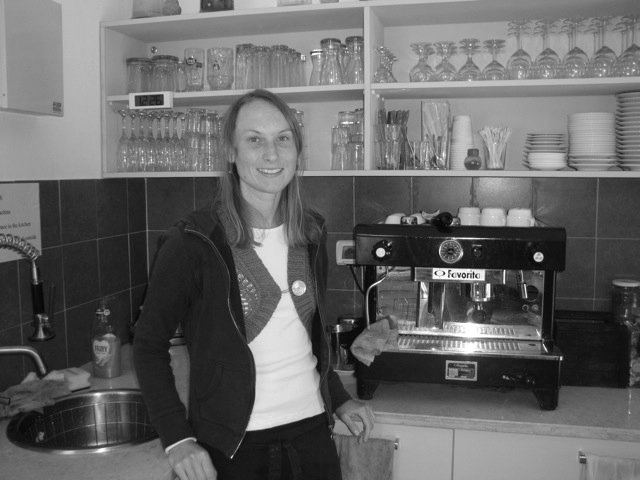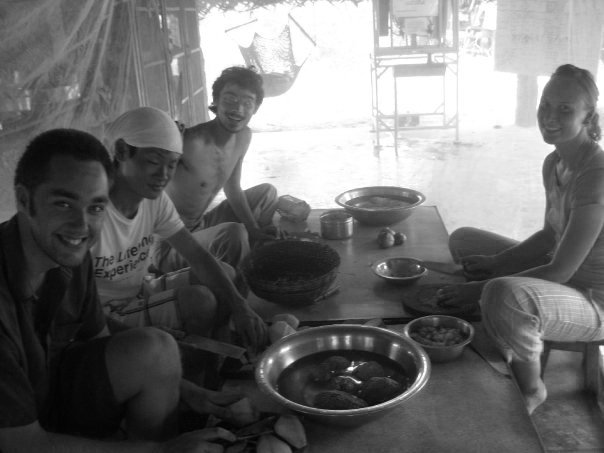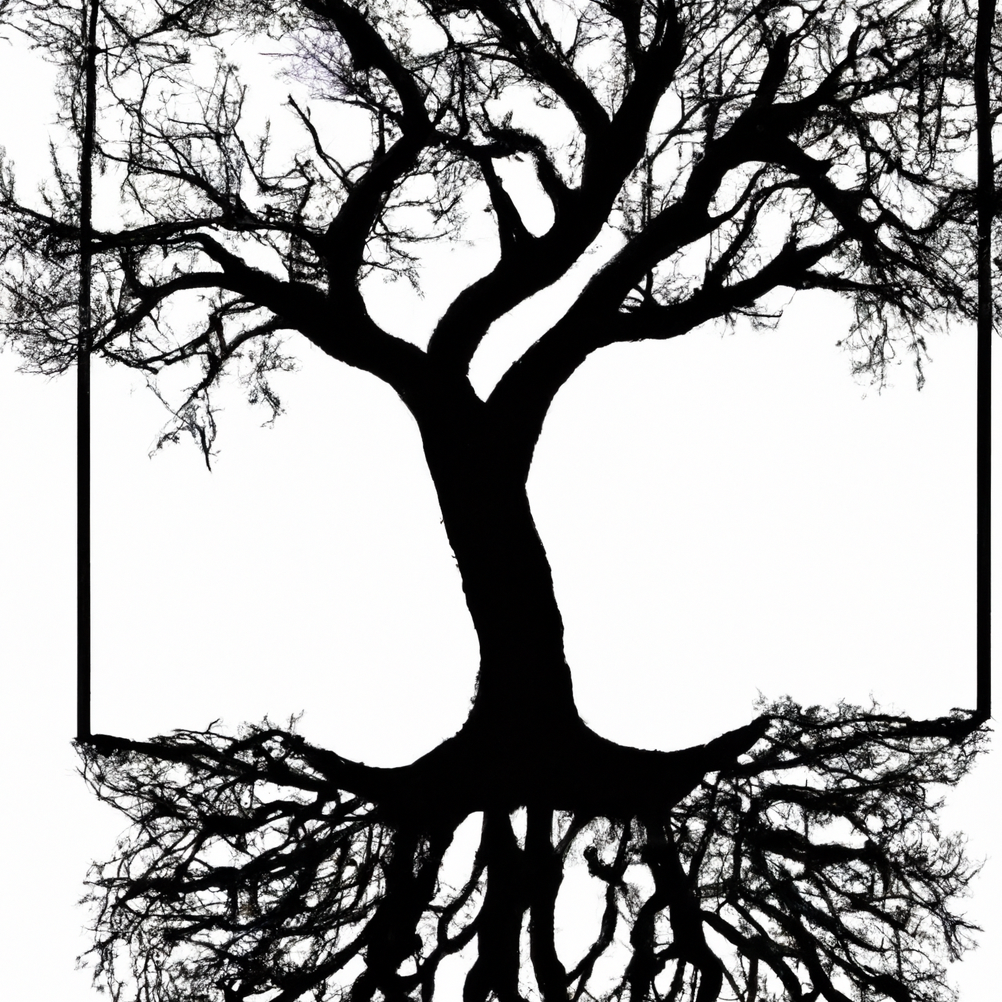From science to philosophy and back…
B.Sc. in environmental sciences
After working as a real estate agent at a building cooperative for about four years, my academic career started with studying environmental sciences at the University of Lüneburg. I enjoyed the multidisciplinary study programme with lectures and courses on sustainability communication, environmental law, statistics, chemistry, ecology and other disciplines. I have particularly fond memories of a course on feminist philosophy of science that sparked my interest in philosophy. While I was writing my bachelor thesis on an environmental ethics topic, I realized that I had more passion for ethics and meta-level questions about science than for conducting scientific research.
Travel and volunteer work
But before I startet studying philosophy, I traveled to India, Nepal and Israel. I spent about nine months in India and Nepal where I did volunteer work in nature conservation and environmental eductation, meditated, worked on an organic farm, practiced yoga and traveled around. After a few months back in Germany, I traveled to Israel. I stayed in Jerusalem for over a year where I managed Café Auguste Victoria that belongs to the Protestant Congregation of German Language in Jerusalem. The small café on the Mount of Olives is run by volunteers and the proceeds are used for charitable purposes.


M.A. in philosophy
My academic career continued in the northeast of Germany. I chose to study philosophy at the University of Greifswald because they offered classes in environmental ethics. I was excited to deepen my knowledge in this field, but after attending some environmental ethics courses and lectures I got the impression that there is only a limited number of theoretical approaches within this field. Gradually I lost interest in applying the same theories to different questions. During my Master’s my focus shifted from environmental ethics to philosophy of science. Given my background in environmental sciences and my ongoing interest in the life sciences, I decided to specialize in philosophy of biology and wrote my master thesis on species concepts in biology.
PhD in philosophy
In Greifswald I worked as a research assistant at the Alfried Krupp Wissenschaftskolleg (Wiko) where I helped oraganize conferences and workshops. One of the meetings that I attended during this time was the Greifswald Phylogenetics meeting organized by the Department of Mathematics and Computer Science. At this conference I was introduced to the mathematics behind phylogenetic trees and I was immediatley intrigued. As I wanted to delve deeper into this topic and analyze it from an epistemological perspective, I applied for a PhD position at the University of Kassel with a proposal for a project on the philosophy of phylogenetic trees.
I was thrilled when I got the position as research associate that also involved assisting my colleague with a DFG (German Research Foundation) grant application. My time in Kassel was very enjoyable and it was great to become a part of the PhilBio community. As I only had a short fixed-term contract for less than two years, I started exploring other options after our grant application was rejected and found a new PhD position with the DFG Research Traning Group EvoPAD at the University of Münster. Working in a new project meant for me that I had to adjust the focus of my research to bring it in line with our subproject’s central topic on explanations in the life sciences. Nevertheless, thinking about phylogenetic trees and reasoning continued to be an important part of my research.
My son was born in 2019 when I was still working on my PhD project. During my parental leave and the strenuous period of the COVID-19 pandemic I could not be as productive as I would have liked to be, but I finally finished my PhD with a cumulative thesis entitled “Kinds of explanation in accounts of pathogen evolution and host-parasite coevolution”. But even before I submitted my thesis, I had already decided to end my career as a researcher.
Entry into research management
To be honest, working in research management used to be my plan B that I wanted to pursue in case my career as a researcher didn’t work out. But although I was offered opportunities as a postdoc at the end of my PhD, I decided to work in research management after careful consideration of my interests, values and strengths. And my play B became plan A.
I started my first job in research management in February 2022 when I was still working on my PhD thesis. As managing director of the Campusrat Oerlikon (Campus Council Oerlikon) at the University of Zurich (Switzerland) my tasks encompassed administrative, organizational and conceptual work. In December 2022 I started working in my current position at the University of Freiburg.

Interfaces
If I had to describe my career path in one word, I would choose ‘interface’. As a student of environmental sciences at the University of Lüneburg I was prepared to work in jobs at the interface of social and natural sciences as well as science and policy. I learned to understand complex problems, think in a networked way and analyse interrelated processes to find sustainable solutions.
As a philosopher of science I worked at the interface of the life sciences and philosophy. This line of work has two dimensions: Actively contributing to scientific knowledge by using philosophical tools (philosophy in science) which often involves collaborating with scientists to work on philosophical problems that originate from the sciences or engaging in concept clarification and engineering. The second dimension involves describing, analyzing and explaining scientific practices (philosophy of science).
My work in research management is situated at the interface of research and research administration. In my current job I perform activities with a service, consulting and management function and often act as a “bridge” between administrative staff and researchers and also between my boss and other team members. I enjoy being part of several worlds at the same time, being able to understand both worlds, mediate between them and bring them together. This communication and mediation work is exactly what makes research managers so valuable.
Recently, I gave a talk on my career change from research to research management at the EvoPAD final symposium at the University of Münster.

CV – short version
Professional experience
| Dec 2022 – present | Research group manager and Prof. Dr. A.M. Klein’s personal assistant, Chair of Nature Conservation and Landscape Ecology, University of Freiburg |
| Feb 2022 – Nov 2022 | Managing director of the Campus Council Oerlikon, University of Zurich (parental leave replacement) |
| Apr 2017 – Aug 2021 | Research associate, DFG Research Training Group Evolutionary Processes in Adaptation and Disease (EvoPAD), Department of Philosophy, University of Münster (Sept 2019 – Sept 2020: parental leave) |
| May 2015 – Dec 2016 | Research associate, Department of Philosophy, University of Kassel |
| Jan 2014 – Apr 2015 | Student assistant, Alfried Krupp Wissenschaftskolleg Greifswald |
| Jan 2005 – Sept 2006 | Real estate agent, Hanseatische Baugenossenschaft Hamburg |
| Aug 2002 – Jan 2005 | Apprentice, Hanseatische Baugenossenschaft Hamburg |
Academic education and degrees
| 2023 | PhD in philosophy, University of Münster (magna cum laude) |
| 2015 – 2023 | PhD student, University of Kassel and University of Münster, philosophy |
| 2015 | M.A. (Master of Arts) in philosophy, University of Greifswald (grade 1,4) |
| 2012 – 2015 | Master’s student, University of Greifswald, philosophy |
| 2009 | B.Sc. (Bachelor of Science), environmental sciences, University of Lüneburg (grade 1,6) |
| 2006 – 2009 | Bachelor’s student, University of Lüneburg, environmental sciences |
